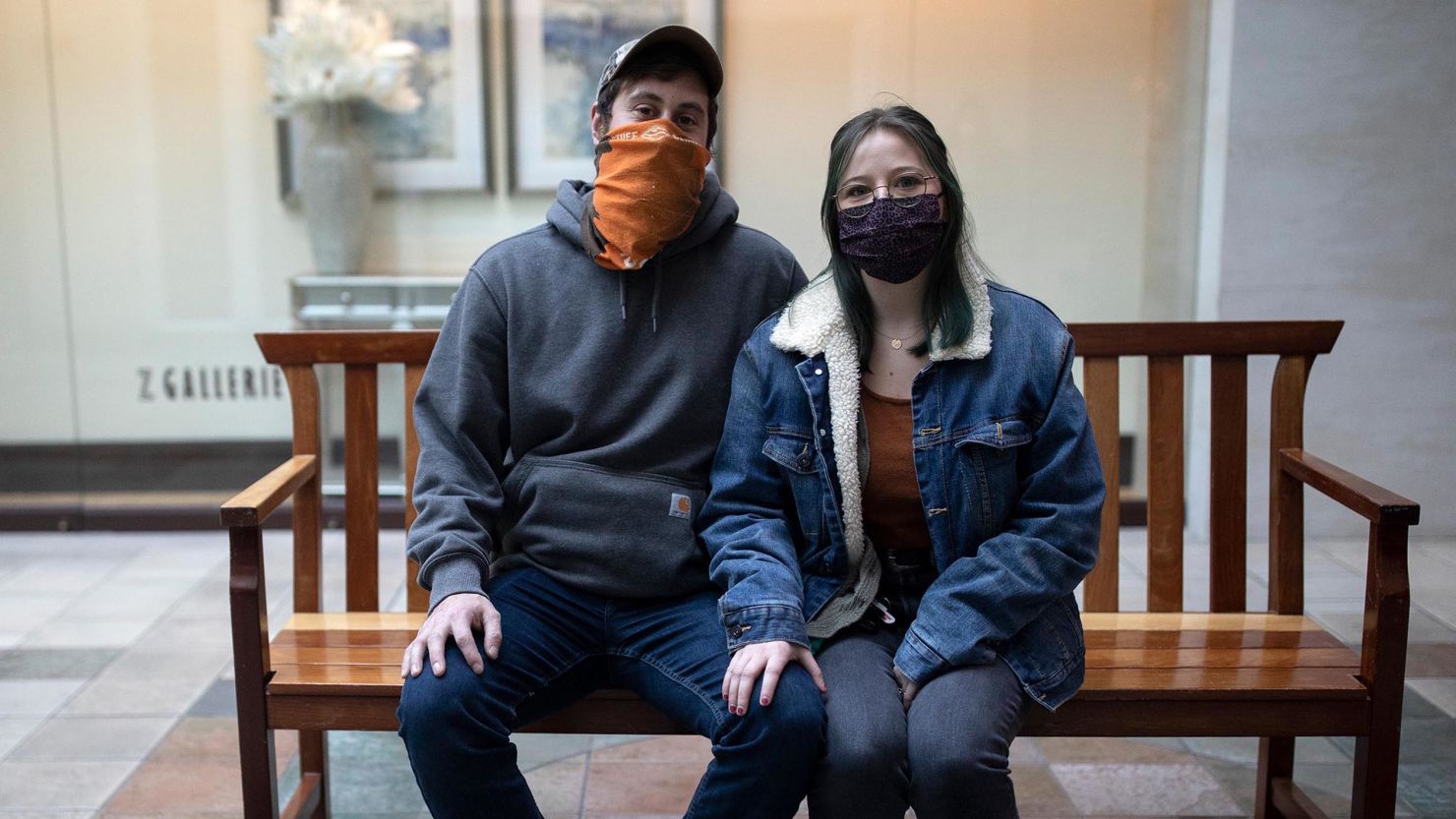Editor’s Note: Reporting contributed from Louisville, Kentucky, Houston, Texas, and Orange County, California.
Heading into the new year, 24-year-old Heather McClintock had hoped she and her fiancé could finally move beyond the stress of the Covid-19 pandemic and focus on their future – namely their wedding in September.
Instead, amid a highly transmissible variant still gripping large swaths of the nation, they have found their lives perpetually disrupted by the virus in recent weeks as they cared for infected family members, set out on epic scavenger hunts for tests and were consumed with worries about whether they and their friends could stay safe at a time when many employers are asking workers to return after shorter periods of quarantine.
“I feel really burned out with this whole thing,” said McClintock, voicing a sentiment felt by many Americans as she ran errands with fiancé Matthew LaBelle, 28, at a Louisville mall last week. Expressing dismay this is now “year three” of the pandemic, she noted she and LaBelle struggled not just to find at-home tests within an hour of their home in Bedford, Kentucky, but also masks and tools like pulse oximeters that can monitor the oxygen saturation in the blood of loved ones who are sick.
“We knew what was coming and yet it doesn’t feel like anybody was prepared for it,” said McClintock, who works for a pool service company. “I feel like we, as a people, haven’t been set up for success.”
As Omicron surged across the United States this winter, many Americans found their lives once again upended as the latest phase of the virus shattered the illusion that the US was approaching a return to pre-pandemic life.
Though cases are down across most of the country since reaching a peak, the daily disruptions continue, from the anxiety-provoking scrambles for child care as children are forced to quarantine, to the mundane inconveniences like long lines and shuttered bank branches caused by labor shortages.
In more than two dozen interviews in Kentucky, Texas and California, many who spoke to CNN described frustration, exhaustion and anxiety as they try to accept uncertainty as their new normal. In Washington, DC, White House officials are trying to strike a hopeful tone, with Covid-19 Response Coordinator Jeff Zients arguing last week the US is continuing to “move toward a time when Covid won’t disrupt our daily lives.” But that future is still difficult for many to envision.
“It’s kind of like a never-ending cycle with all the variants and everything,” said Gilberto Reyes-Chuela, 24, a college biology student who works at a Hispanic grocery store in Louisville owned by his parents. The mental health toll of daily life is still heavy, he said, from arguments with customers over masking to those who arrive asking for money to help bury relatives who have died.
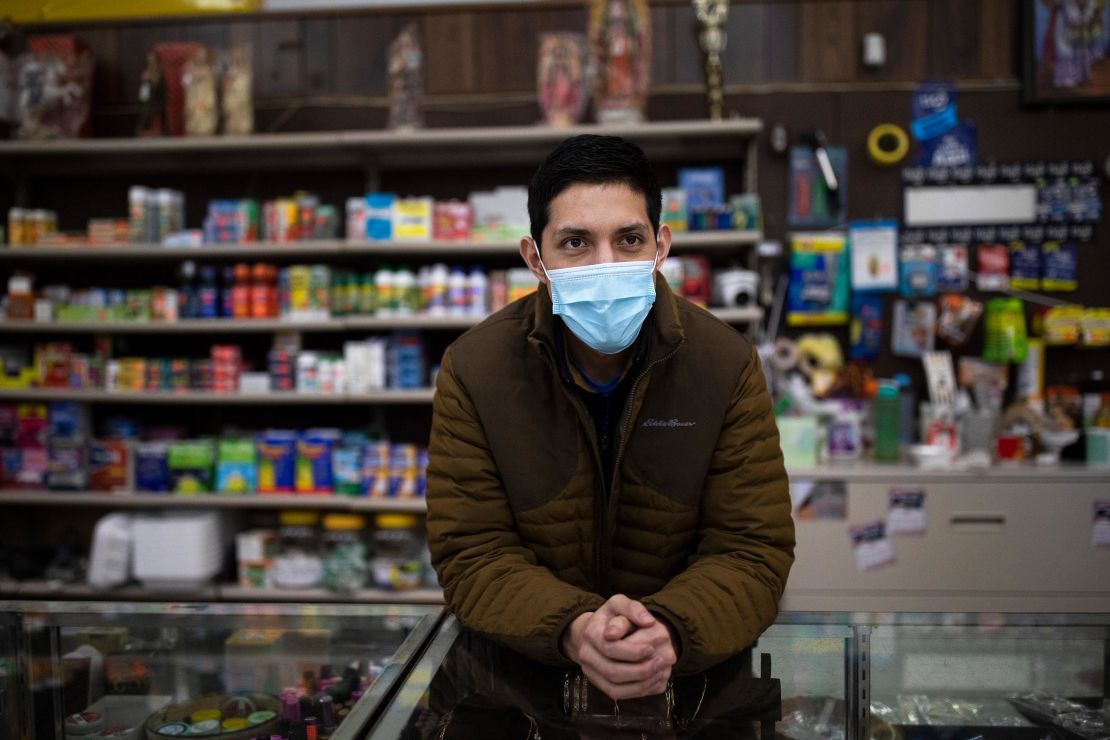
“They’ll come in and bring like a little box, and they’ll ask for money so they could send the body back to their home country to be buried … Sometimes you recognize the people and – this is more of a mental thing – you realize that life is short,” Reyes-Chuela said. “I don’t know if we’re turning a corner or getting out of it, but I think we’re just in a rut.”
For some who have chosen to remain unvaccinated, there have been huge life changes. Toccarra Gartin, 39, the mother of a 17-year-old and 4-year-old from Floyd County, Indiana, said she was terminated in October after her employer, a health insurance company, did not accept her request for a religious exemption to the Covid vaccine. Gartin is Rastafarian, a religion she has practiced for more than a decade.
She cashed in her 401(k) to support the family but worries about keeping up the payments for the internet – especially if her kids are in remote learning – as well as the mortgage and car payments.
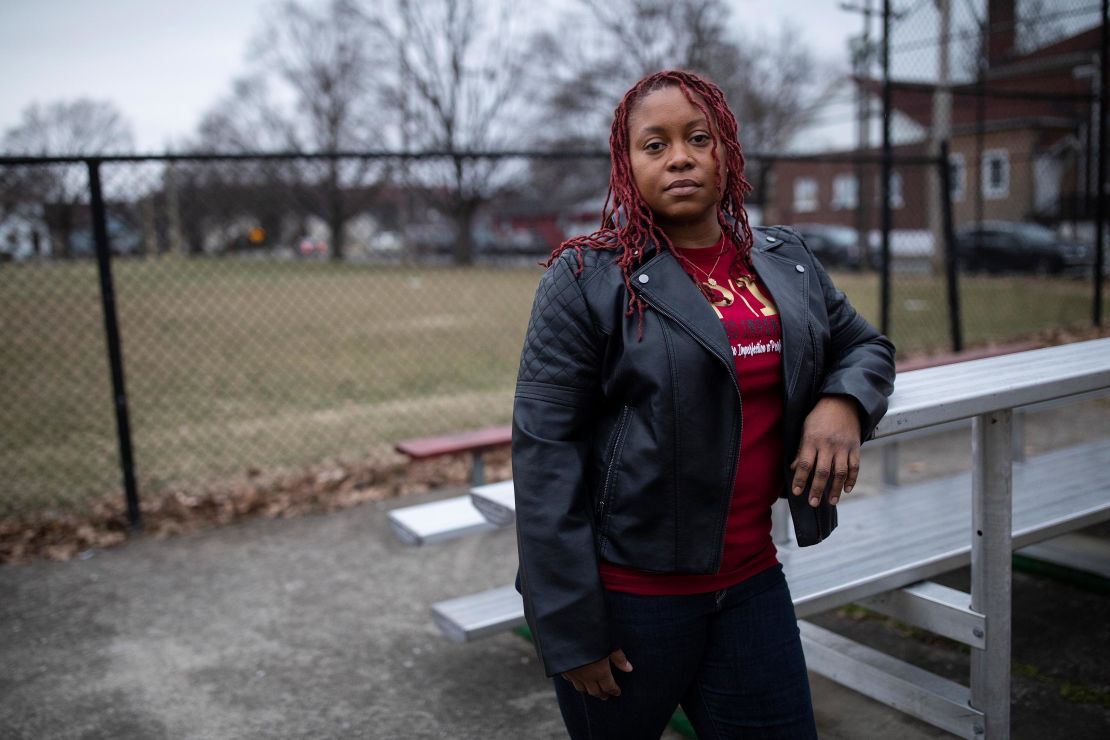
“I’ve been looking for employment. Unfortunately – I think it is due to me not being vaccinated – I submit my religious exemption whenever I do apply, but the majority of the time I get, ‘Thanks for trying, but we went with someone else,’” she said.
Gartin said she wears her mask faithfully and gets tested each week but has still lost friends over her vaccination status and often feels as if she is being treated as a “second-class citizen.”
“Mentally, that has drained me,” she said.
Unlike Gartin, many workers have been voluntarily leaving their jobs through the pandemic, with older Americans citing early retirement and young people looking for better pay. Omicron has become another factor in the complicated reality of the pandemic-era labor force. During the period from December 29 to January 10, a stunning 11.9 million people said they could not work because they either were sick from Covid, caring for someone with coronavirus symptoms or because they were concerned about getting or spreading the virus, according to the Census Bureau’s most recent Household Pulse Survey.
The fear of getting sick with Covid-19 recently led Diana Lopez, 38, to quit her job at a Tex-Mex restaurant in Houston. If she were to become severely ill, she said the virus could mean leaving her three children, ages 6, 9 and 13, as orphans in a relatively new country after relocating from El Salvador a few years ago.
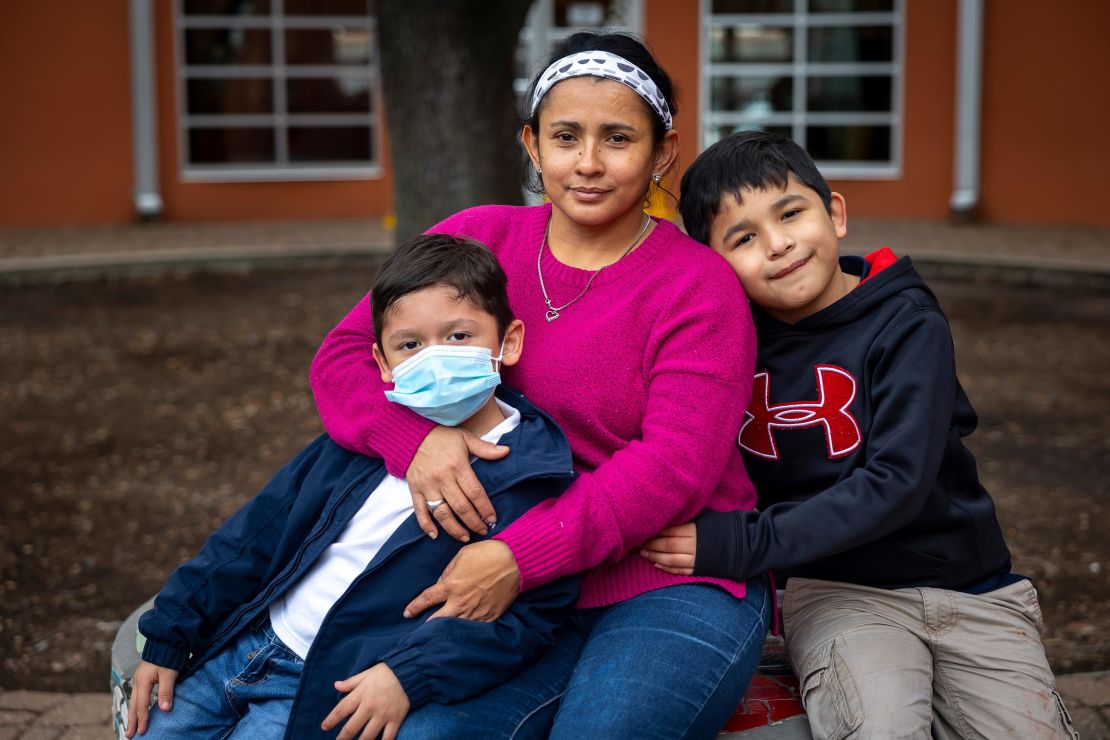
“I couldn’t stand seeing co-workers who were in the kitchen with (Covid-19) symptoms talking about not wanting to get vaccinated or saying the virus is not real. I’m scared because they were just sent home to quarantine and return to work within days. There are no other health measures, like asking employees to get vaccinated,” said Lopez as she watched her children climb and run at a playground.
For the past week, she’s been applying for jobs and hoping she will be hired to stock shelves at a Walmart. It’s a job that would allow her to socially distance more than working at a restaurant, and those safety concerns are paramount to her right now.
People are ‘eager to have their freedom back’
Martin Campa, a professional clown in Houston known as Tin Tin Campa, who earns his living making families laugh at parties, has watched people’s attitudes about the pandemic change over the past few years from fear and resilience to indifference.
“Sometimes it seems like people forgot about the pandemic. They are not wearing face masks at all. They are dancing close to each other. I’ve been to homes where there are zero (health) measures taken,” Campa, 49, said in Spanish as he applied his clown makeup at a mall in the Houston suburb of Humble.
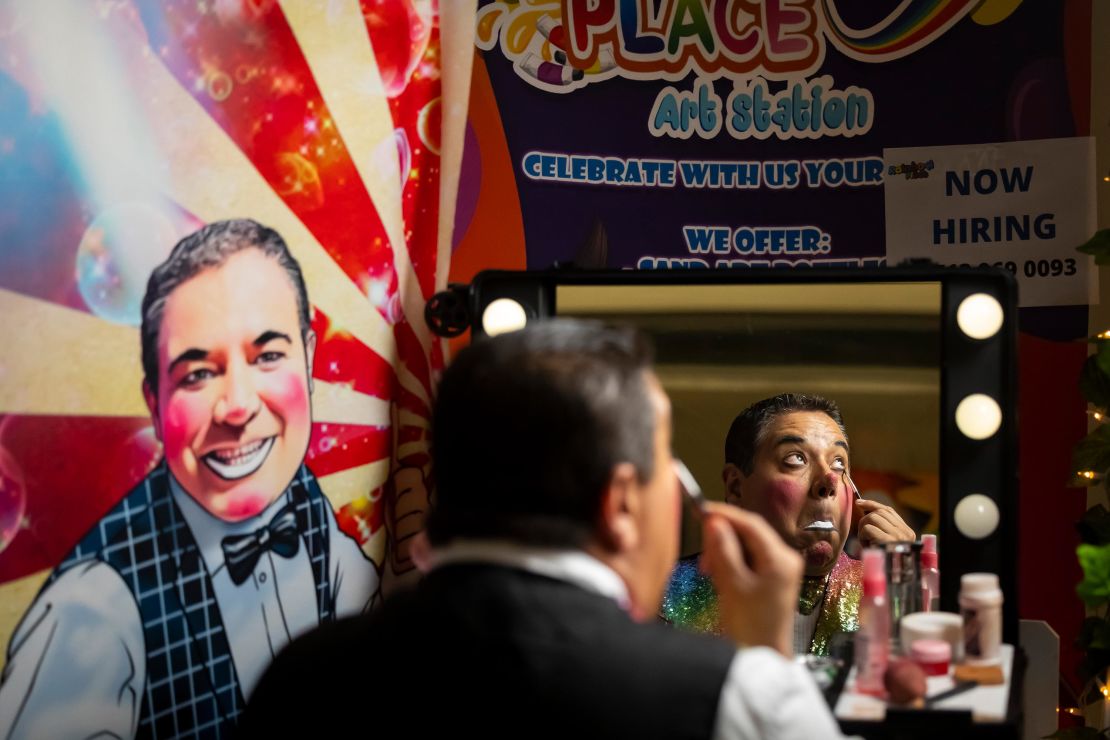
“It’s complicated. … I entrust myself to God…and may it be what God wants,” he added when asked about what he does in those circumstances. “Thankfully, I’m fully vaccinated and boosted and if there’s another dose, I’ll take it.”
The pandemic pushed Campa to find a new life. After the Circo Hermanos Vazquez, the renowned circus he was a part of, temporarily shut down due to Covid-19, Campa was left with no home, no income and a family to feed. He initially painted homes and delivered food but as Americans longed for a return to normalcy and began throwing parties, he found a way to once again entertain as a clown.
“They were eager to have their freedom back, eager to laugh again. Because they can’t go to the circus or go to the movies, they are bringing entertainment home,” Campa said.
Still, grim reminders of the pandemic persist. In May, Campa said a family canceled a party when a mother died from Covid, and days later, decided to host the festivities to help the children cope with the loss.
The collective eagerness to reach a sense of normalcy has taken a heavy toll on health workers at the HOPE Clinic, a community health center for the uninsured in Houston with a focus on the city’s Asian American community.
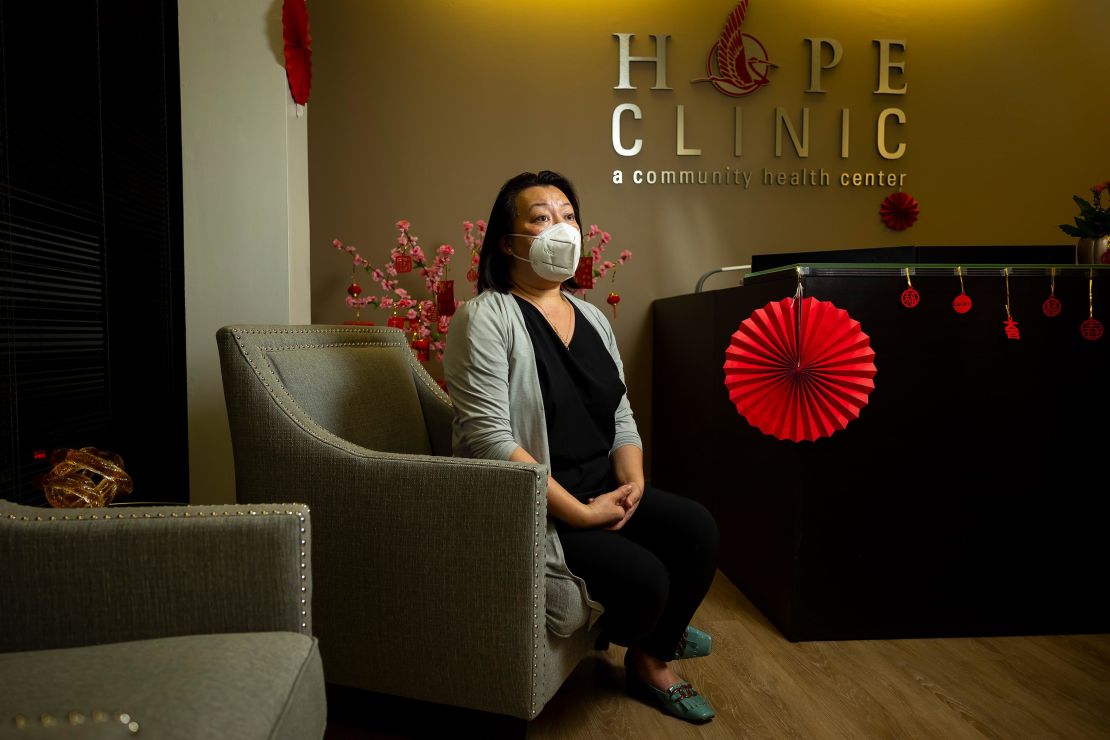
“We have to operate low because we have no staff or the staff is so burnt out. You can see the unhappiness, stress and anxiety on their faces,” said Shane Chen, the clinic’s chief operating officer, adding the clinic recently reduced its service hours indefinitely to accommodate staffing shortages caused by Omicron infections.
Staff members have been “frantically trying to get people tested and vaccinated,” Chen said, while keeping themselves and their loved ones healthy for months. But at some point, after many waves of the pandemic, “the resiliency of people starts to wane,” she said.
With waves of school infections, the work-life juggling act returns
Covid-19 cases cycling through schools have also created continual stress for parents across the country as warning notices from school officials seem to arrive each week, announcing new cases and potential exposures for close contacts.
The Biden administration has insisted children can remain in school through test-to-stay procedures, but school testing and quarantine policies still vary widely, sometimes with different rules for children who are vaccinated and unvaccinated.
Scattered districts across the country have returned to remote learning for stints ranging from a day to weeks, because of staff shortages or high case numbers, including some public schools in Kentucky, Texas, Idaho, Oklahoma, Michigan and Maryland. Flint Community Schools in Michigan recently announced they would extend their virtual learning period indefinitely, the worst-nightmare scenario for parents who cannot stay home.
Laurel Golden is one of the Chicago Public Schools parents who sued the Chicago Teachers Union in early January to force schools to open after the union’s teachers refused to show up for in-person classes because of Covid concerns. She said her nine-year-old son will only have had five days of in-person learning in January by the time he goes back, including the days lost during the weeklong standoff with the union, followed by a mandatory 10-day quarantine after her son was exposed to Covid in his classroom.
Life right now, Golden said, “is a state of not knowing what the next week will bring.”
“I get these emails two to three times a week sometimes from their schools, and it says there’s been an exposure in the school – and if you need to take further action, you’ll get a further email,” said Golden, who has three sons in public school. “Then I breathe a sigh of relief when I see it’s not for one of our classrooms.”
Though she had hoped to return to her work in customer service, Golden told CNN she put those plans on the “back burner” when the standoff began between the teachers’ union and the district. “There’s too much unknown,” she said. (Chicago students returned to in-person instruction in mid-January after the union reached an agreement with city and district officials for upgraded safety protocols).
Fatima Omar recently faced a nerve-wracking situation when she was told her 10-year-old son would have to stay home from his school in Houston for a week after a classmate tested positive for the virus. Her mother died early in the pandemic and she has made it part of her family’s routine to sanitize their home and get tested often.
“I was very scared. Oh my God. … It was too much,” said the 33-year-old in west Houston while waiting in the car pick up line at her son’s school. “I’ve lost a lot of people to the virus.”
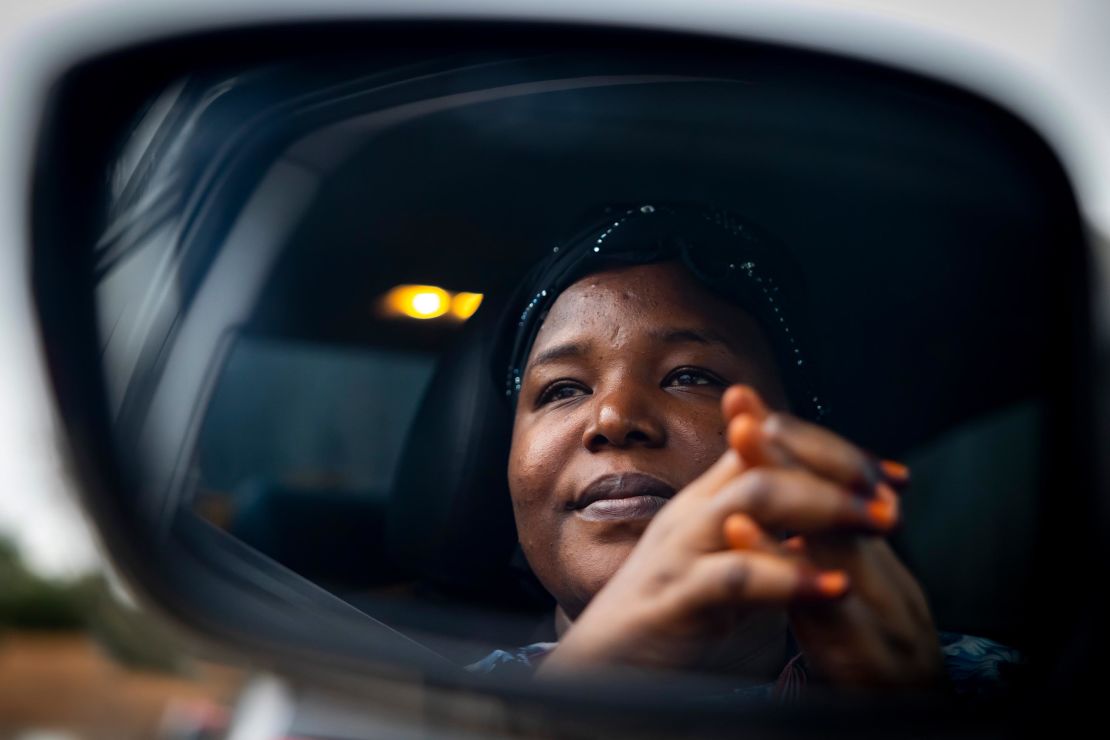
Shahrzad Javid, a 38-year-old single mom, turned to her “village” – her parents, her brother and sister-in-law, and some close friends – to help juggle her seven-year-old daughter’s new schedule when Louisville’s Jefferson County Public Schools returned to remote learning for a two-week period that ended earlier this month.
“It feels like your life just becomes very jumbled. And then you have to just take a step back and say: ‘This is the situation, so I’m going to do the best I can,’” said Javid, who works for a Louisville land development company.
And for other parents, staying home with their children during remote learning and having to miss work simply isn’t an option they can afford, several Louisville residents told CNN.
Jefferson County parents were advised the district will make a “day-to-day” determination on whether classes will remain in-person, meaning moms and dads like Javid are living text message to text message.
It’s not just parents who are in a precarious position. Many told CNN remote instruction hindered their children’s school progress and had a profound impact on their mental health.
Steve Ullum, a real estate agent and single dad to his 11-year-old daughter, moved away from the Jefferson County school district to enroll his daughter into a private school last fall to avoid more remote instruction, after her grades plummeted and her stress “skyrocketed.”
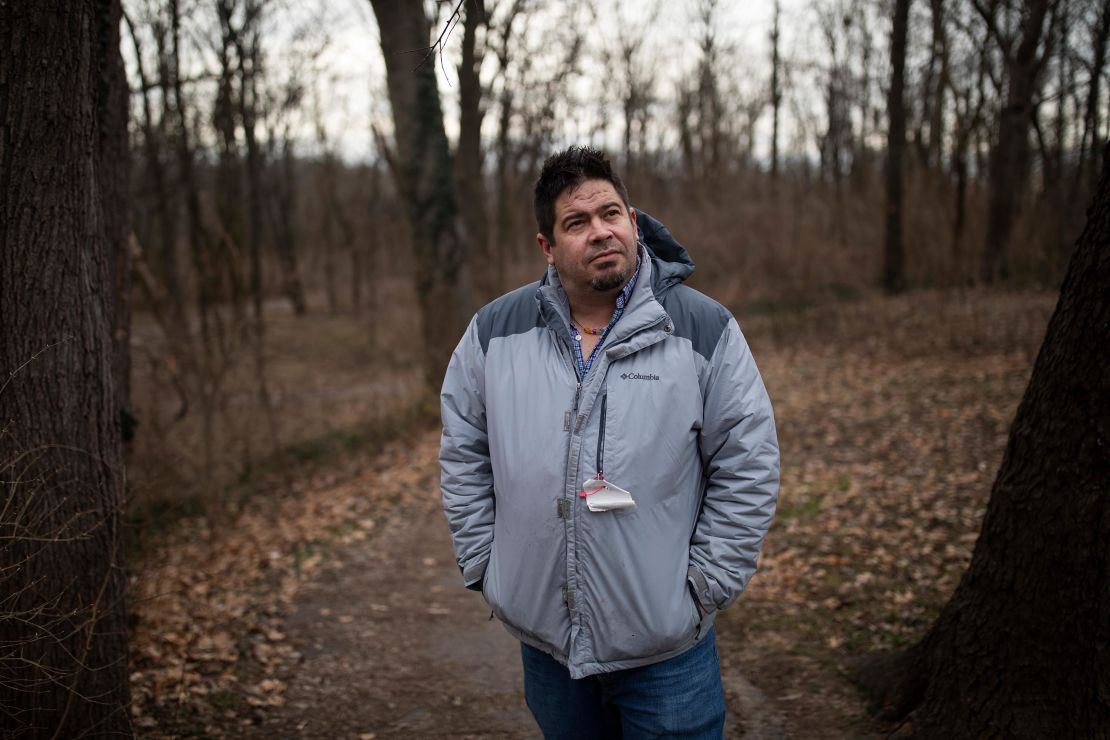
“I couldn’t watch my daughter sink any further,” he added.
For parents of young children, constant vigilance and a waiting game
For families with young children under the age of 5 who are not yet eligible to be vaccinated, or parents who do not yet feel comfortable vaccinating their children, life often feels like a recurring battle to stay vigilant and keep their kids safe.
Lilibeth Rivas, 20, had hoped to be working in a warehouse in Santa Ana, California, this year while finishing her GED, but it would require putting her two-year-old and three-year-old children in day care. Though she is struggling to pay for food and rent, she says she still cannot bring herself to take that step after watching the near-death experiences of so many family members who contracted Covid.
“Everybody got Covid except me and my kids, the little ones,” Rivas said as the family spread out on a blanket at a Santa Ana park to celebrate her mother’s birthday. “Everybody almost died from that.”
“I haven’t worked because of my kids. I don’t want to expose them,” Rivas said, noting the park visit was their first time leaving the house for fun in nearly a month. “Even for school, I only go like once a week, or twice, so I won’t get exposed around there.”
It’s a struggle many are living across the country.
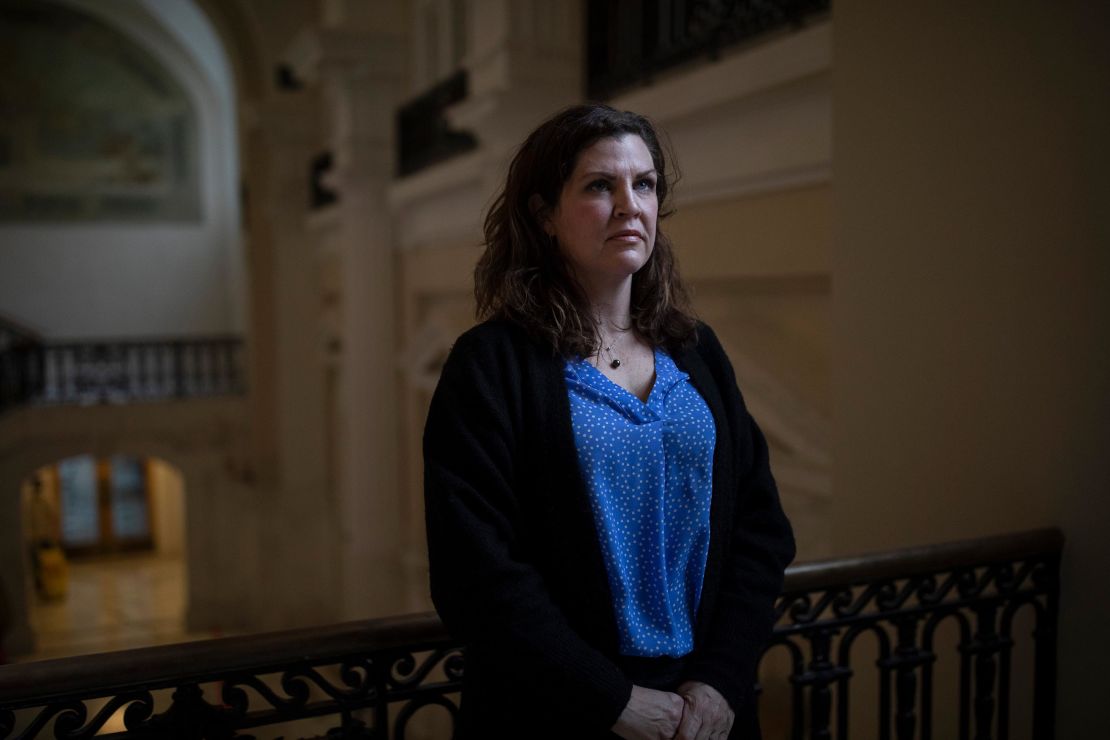
Rachel Weiss, an associate professor of medicine from Shelby County, Kentucky, who has five-year-old twins and a two-year-old daughter, said her family has “successfully navigated two-plus years now without anyone becoming sick.” Their primary goal is “to keep the virus out of our family, at least until the youngest can get vaccinated.”
It requires constantly re-evaluating the safety of everything the family does. They still worry most about what the impact of long Covid could be on their children, symptoms Weiss says she has seen firsthand through her work. One large study last year revealed one in three Covid-19 survivors experienced symptoms months after getting infected, including breathing problems, abdominal symptoms, fatigue, pain and anxiety, among other issues.
“I make my decisions for our family and for my kids based on, ‘Will I be OK with that decision 10 years from now?’” Weiss said.
“If one of my kids, or myself, or family member ended up with long haul (Covid), because I was tired of wearing a mask or wanted to go to something that I knew was unsafe – but it was just easier to say yes to – would I be OK with that decision? For me, the answer is no.”
